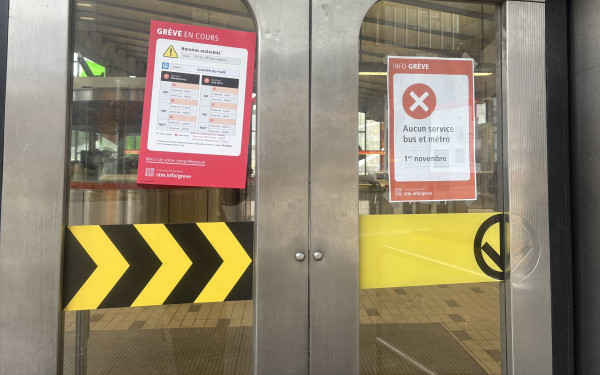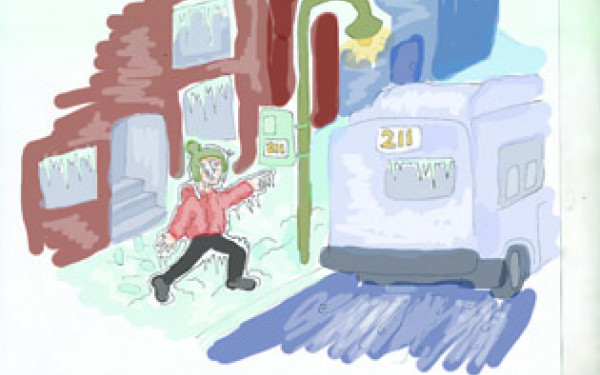Sexual Assault on the STM Needs to Stop
Public Transportation is a Haven for People With Predatory Intentions Looking to Commit Their Acts of Assault With Little Risk
“A man masturbated over his pants while staring at my daughter (of minor age). No attempt to try to hide his actions. Mortified, my daughter immediately changed cars.”
A mother, not too long ago, wrote those words in a complaint to the Société de transport de Montréal. This complaint alone bears witness to the fact that public transportation has never been safe for women.
I read this complaint, and many more like it, in a document compiling all the complaints sent to the STM in the past two years, obtained by The Link through a freedom of information request.
I pored over accounts of women being sexually harassed in a seemingly endless stream of stories; women have reported being followed, having a picture taken up their clothes, being touched, being grabbed, being groped, being yelled at and propositioned, and most common of all, being stared at by a man touching himself.
All by men, all in public.
Public transportation is a haven for people with predatory intentions looking to commit their acts of assault with little risk of repercussion.
There is an unspoken understanding to avoid making a scene on public transit, to keep to yourself, and to keep quiet. What’s more, we all have a place we’re trying to get to; we are trapped by our circumstances. In some cases, it would be unsafe to hop off at a random stop before your destination to get away from that creep who won’t stop staring at you.
All of this is to say that sexual harassment is a plague on the STM, and yet not nearly enough measures have been taken to cure it.
Unfortunately, without any more than a physical description to go on, there isn’t much that the STM can do to catch these predators once they have already committed their act.
Some complainants said that there aren’t enough police officers or security guards in the metro cars and on the platforms since there was no one around to help them when they needed it. Even then, police officers have a history of ignoring women and dismissing their experiences when faced with accounts of their harassment.
Police officers can also make some communities feel unsafe or uneasy even without the stress of having to share a traumatic experience.
Several of the complaints ended with women saying that they are too scared to take public transit anymore, since they do not feel safe. Some women rely on the STM as their only mode of transportation—I know I do.
The most traumatic part of taking public transit should be missing your bus.
I imagine countless women have wanted to avoid using public transit after being harassed but have had no other option.
Here is my own complaint, never submitted: last year, an old man sat next to me in the back seat of the crowded 105 bus and struck up a conversation. He asked me how old I was and, thinking he was a kind elderly man, I told him I was 18. From then on, the conversation escalated, and he began saying progressively more inappropriate and sexually suggestive things.
He pretended to fall asleep after I ignored him. He leaned further and further towards my seat, and I squished myself further into the window.
I felt trapped.
I knew people all around me were aware of what was happening. They would dart sympathetic glances my way or make a point of avoiding eye contact.
I didn’t want to say anything because I was embarrassed and I downplayed the gross actions of the man at the time. I was counting down the stops until I could get off.
Even though I was scared of the possibility of being stuck with that man again, I had to force myself to take the same bus, lest I abandon my job and miss all my classes.
I don’t hold contempt for the bystanders who were on the bus with me; the fault lies with the predator alone. However, I believe we all have a responsibility to help people that we see are uncomfortable or in an unwarranted situation.
Something more needs to be done to create a safer environment for women, one where we can dare to exist without men taking that as an invitation to grab us, to stare at us, or to proposition us.
It’s not enough to just read through complaints or to hang a few anti-sexual harassment posters in the metro cars. Something so vital and elemental to the structure of the city as public transit should not be a breeding ground for harassers to find their next victim.
For those of you reading this who aren’t harassers: speak up if you see someone being harassed. Don’t give in to the bystander effect.
And for those of you reading this who are harassers: Women do not exist for your sexual satisfaction. We are just trying to live our lives by commuting from point A to point B.
The most traumatic part of taking public transit should be missing your bus.
__With files from April Tardif Levesque_







